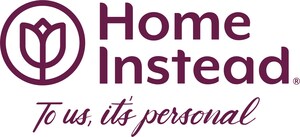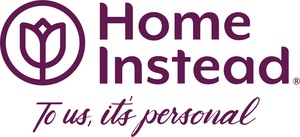Home Instead® encourages families to take notice of changes as they visit older loved ones
OMAHA, Neb., Nov. 17, 2023 /PRNewswire/ -- The number of travelers this Thanksgiving is expected to be the third highest in AAA forecast history. Whether traveling 20 miles or 2,000, families spending extra time with aging loved ones this season may notice changes in health, behavior, or environment that could signal a need for adjustments or assistance.
As a leading provider of in-home care for older adults, Home Instead® encourages families to keep their eyes open for opportunities to address safety concerns and help older family members thrive. Older Americans have access to a wide range of products and services that make their goal of aging in place possible, but many aren't aware of signs they may need some help.
Whether it's a change in mobility, loss of appetite or forgetfulness, addressing these issues are essential to ensuring your loved one is able to live safely as they maintain their independence.
"If you notice signs your aging loved one is struggling with daily tasks, don't shy away from difficult conversations," said Jenny Munro, gerontologist at Home Instead. "If you're concerned your loved one will resist the discussion or the proposed adjustments, gently remind them of their ultimate goal. By having an open dialogue, you can help them decide what steps to take so they can continue to live independently."
Munro suggests keeping an eye out for the following signs that indicate an older loved one may need assistance to continue aging in place safely.
- Unkempt Home. If the home's condition doesn't seem up to your loved one's typical standard, it may be a sign that they are having difficulty keeping up with daily tasks. Help them set a home maintenance schedule and consider arranging for help around the house.
- Mismanaged Medicine. If your loved one has multiple prescription bottles, encourage them to use a labeled pillbox. Create a list of all prescription medications, over-the-counter products, and supplements with instructions.
- Eating Habits. Changes in weight could indicate an unhealthy change in eating habits. Check the fridge and cupboards to ensure food is well stocked and not expired. Share meal prep ideas or look into meal delivery services to ensure a variety of nutritious foods. Older adults who are lonely are twice as likely to skip meals. If your loved one lives alone, encourage them to invite a neighbor over for dinner or start a lunch club with friends.
- Difficulty Completing Familiar Tasks. Missteps in activities they do regularly, such as following a favorite family recipe, could be early warning signs of dementia. Encourage your loved one to make a list of things to discuss with their doctor, including changes in behavior. Consider offering to join your loved one for their next appointment.
- Balance and Mobility. If your loved one is unsteady on their feet or using walls to support themselves, they may be at risk of falling. Just one fall doubles the chances of falling again. Conduct a room-by-room home safety checklist and assess what updates may be needed.
If your loved one is showing signs of difficulty with daily living activities, consider enlisting a professional caregiver who can help with personal care, meal prep, and other household tasks that enable older adults to live safely and comfortably in their own homes for as long as possible.
"While there may be a desire to keep the conversation light during the holiday season, it's important to address loved ones' well-being if there are any concerns," Munro said. "Approach the conversation with empathy, follow your loved one's lead, and remember you can only do so much in a single visit. Try to keep it to one conversation this trip. Spend the bulk of your time together enjoying treasured traditions."
Creating a safe environment for aging in place requires continued conversation and encouragement. Home Instead offers a list of conversation starters and an action plan for successful aging. For more information about supporting your older loved ones' aging journey, visit www.homeinstead.com/care-resources.
ABOUT HOME INSTEAD, AN HONOR COMPANY
Home Instead, Inc. and its parent company, Honor, are expanding the world's capacity to care. With the world's largest home care network and the most advanced care platform, Honor and Home Instead are revolutionizing care for older adults, their families, and Care Professionals. Home Instead, Inc. is the premier home care franchisor through its network of independently owned and operated Home Instead franchise businesses. Combined, the network has more than 100,000 Care Professionals across 13 countries, meeting the growing needs of millions of older adults and their families worldwide. For more information, visit joinhonor.com and homeinstead.com.
SOURCE Home Instead

WANT YOUR COMPANY'S NEWS FEATURED ON PRNEWSWIRE.COM?
Newsrooms &
Influencers
Digital Media
Outlets
Journalists
Opted In





Share this article